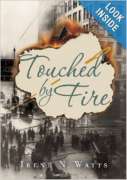
Touched by Fire
Written by Irene N. Watts
Tundra Books, 2013, 197 pp.
ISBN: 9781770495241
Told from the perspective of a young teenager, Miriam, Touched by Fire takes readers on the journey of a family who flees from the pogroms of Russia in 1905 to Berlin where Jews do not have a peaceful existence and finally to America where discrimination is again a challenge. Along this journey the family faces many social issues–disregard for human life, family separation, the stressful conditions faced by immigrants entering the US, and the lack of laws regulating workplace safety. These issues are approached in an engaging manner with details to support authenticity and invite questions and further research of readers; however, although the author does not shy away from the events, the details are described in a suitable manner for readers age 10 and above.
Fire is a theme that connects events of Miriam’s life since the story begins with her recurring memories of the pogroms burning their houses and barns and reaches a culminating part of the plot when 146 people, mostly girls on the 9th floor of a factory, die due to lack of safety measures. These historical events provide an authentic framework for readers as the author, Irene Watts, explains terms such as pogroms and Shirt waist within the characters’ dialogue. Through the personal experiences of Miriam, her family, and her friends, readers realize the many challenges faced by those fleeing from discrimination in search of a better and safer life. As Miriam makes the journey alone to America due to her baby sister’s health that delays family members from traveling with her, readers get a keen sense of the unpleasant days on board the ship. Those days are followed by the joy and freedom she feels when she arrives in New York where her father has been for a long time, especially as she passes the many examinations that make entering the country stressful.
Despite the negative experiences and challenges Miriam faces, including the factory fire that takes the life of a dear friend, she demonstrates the persistence and courage of the immigrants who came to America, “The Golden Land,” for a better life. As her father says following the fire, “You have been spared, and now you owe it to those who were not to live a full life” (p. 175). The final chapter, the Epilogue, takes the reader forward 22 years to Berlin and it is here one learns of the fate of Miriam and her family. Peter, the son of Miriam’s brother who never joined the family in New York and later died, becomes the narrator and shares his situation, living with a step-father who is German and seemingly detests Peter. The theme of fire appears again as Peter observes book burning by Hitler Youth. Enter Miriam and her husband, a Russian who fled to America with her family, and their success in business is revealed as they negotiate with Peter’s mother to take him back to the United States to escape the dangerous situation in Germany. The story ends on a note of hope as Peter begins his journey to America.
Born in Germany and an immigrant herself, Irene N. Watts now lives in Vancouver, Canada. She has written numerous award winning books that have been translated into Italian, French, and Dutch as well as other languages. Her experiences leaving Germany as a child on a Kindertransport create a keen sensitivity for the experiences of the characters in her book. She has also written plays for professional theater. More information about Irene can be found on her website.
Rich pairings of books that speak to the resilience and courage of children facing challenges that displace them from families can be found within the author’s own works and include No Moon (2010) and Goodbye Marianne (2008). Global connections among countries can become significant for young readers as they realize the stories of early immigrants and explore their own family’s heritage as found in the journeys of earlier generations. Other books that encourage readers to consider their own heritage though the global links within the stories include: Bridge to America (Linda Glaser, 2005), Letters from Rifka (Karen Hesse, 2000), and A House of Tailors (Patricia Reilly Giff, 2006).
Janelle Mathis, University of North Texas, Denton, TX
WOW Review, Volume VII, Issue 4 by Worlds of Words is licensed under a Creative Commons Attribution-NonCommercial-ShareAlike 4.0 International License. Based on work at https://wowlit.org/on-line-publications/review/vii-4/
